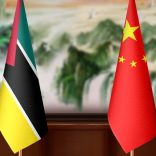President Chapo holds meeting with Mitsui CEO
Hidden debts in Mozambique: Why the silence about the VTB?

VTB building in Vienna, Austria
Does anyone still remember Russian bank VTB in the case of hidden debts? Why are the guns levelled only at Credit Suisse? Banking titans’ moves may be the reason, as well as opaque agreements between Mozambique and Russia. Read the DW report.
Russian bank VTB seems to have been forgotten in the case of Mozambique’s ‘hidden debts’. But out of the nearly US$2 billion involved, US$535 million was loaned by the VTB to MAM, one of the three companies which borrowed heavily.
But, so far, Credit Suisse is the bank most referred to in the corruption scandal, and the sole target of a lawsuit in London.
Mozambican economist Muzila Nhansal wonders about the silence on the VTB’s participation, pointing out: “There are certain international banks that have been ignored in this case. Why are they attacking only Credit Suisse, as if it were the only bank [involved]? Why is Russian VTB, for example, not being attacked? Why are the same actions not being taken against Russia?”
VTB “solving this problem another way”

As the hidden debt scandal exploded, Mozambique very quickly approached Russia, and reached an agreement whose details are not publicly known. In March 2018, the Russian Foreign Minister, Sergei Lavrov, visited Mozambique, and an understanding on how to settle the debt was announced at that time. Mozambican Foreign Minister José Pacheco said at the time that “the director-general of the Russian bank VTB [Andrey Kostin] had been in the country and worked with the relevant sectors in this area”.
Commenting on this approach, journalist Fernando Lima said: “I think the [Mozambican] government has long-established channels of communication with the VTB and the Russian administration itself, and is using these to solve this problem in a different way.”
“I know that in a meeting last year it was even said that if things got very complicated there was a potential underwriter for the total debt, which was Russian, but it was not said who it was. [It was also said] that the situation was under control. For what it’s worth, that is what members of the central committee had explained to them on the subject.”
Credit Suisse losing in war between titans?
Apart from the few transparent agreements between governments there have also been opaque moves in the powerful world of the big banks. Economist Muzila Nhansal suspects that the negative exposure that Credit Suisse is now subject to is a kind of revenge by some sector of the powerful banking world for being eventually excluded from the agreement with the Mozambican authorities in this case.
“It is a matter of trying to see who is behind the VTB, because sometimes it appears to be a Russian company, but we do not know who the shareholders are and what interests are behind it. It may be someone that nobody has an interest in touching,” the economist muses.
“The Russians should also [be subject to a lawsuit] because the money was not only from Credit Suisse, and you’re not going to tell me that VTB money was the only lawful request. I have not yet heard an explanation, and there are still a lot of unanswered questions. But it is strange that only Credit Suisse is going to pay for the case. I believe it is a problem within banking circles, there are those who couldn’t swallow Credit Suisse stealing a march on them.”
VTB a strategically closed door?
If, in the case of Credit Suisse, it is clear that there have been wrongdoings, almost nothing is known in the case of VTB.

Is it the case that any whether possible illicit goings-on in the contracting of the loan with the Russian bank would be kept secret indefinitely?
“”More or less, because this agreement is even weaker than all the agreements with Credit Suisse. That is, safeguards in relation to the agreement were much worse because the Russians do not have the same rules of procedures or policies which Western banks have, ” Lima answers.
“Although Mozambique’s relations with Russia are not the same as with China, for example, there is still a good relationship, and what Mozambique, like most African countries, loves in these things is that these countries, especially those of the old Soviet Union, have this principle of ‘eat it and keep quiet’, and don’t give out much information.”
“What Mozambique is trying to do as best it can is to tie up all the loose ends and ensure that the least possible information about all these matters comes out,” Lima concludes.
One is left wondering whether Mozambique shouldn’t expect another bomb to go off someday…












Leave a Reply
Be the First to Comment!
You must be logged in to post a comment.
You must be logged in to post a comment.